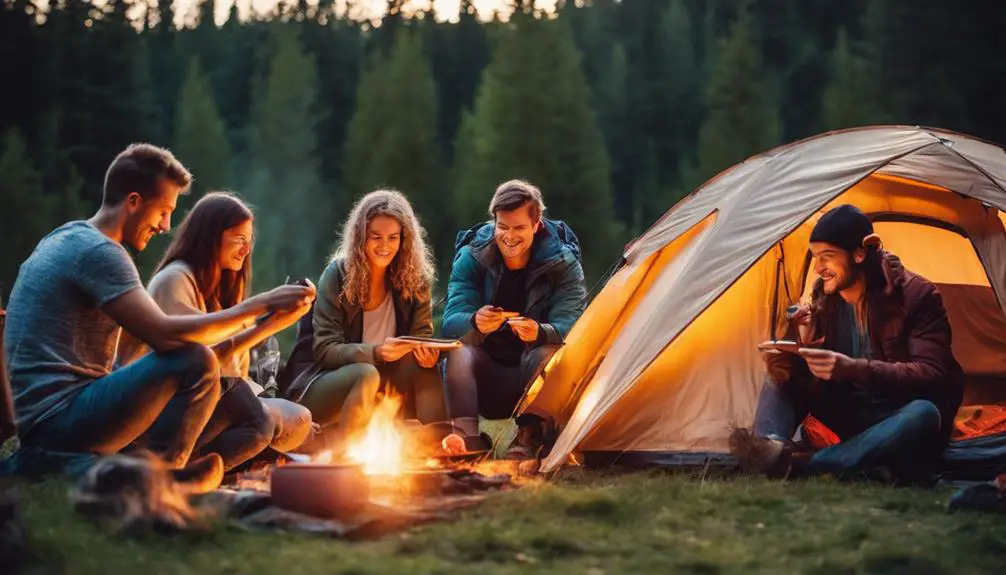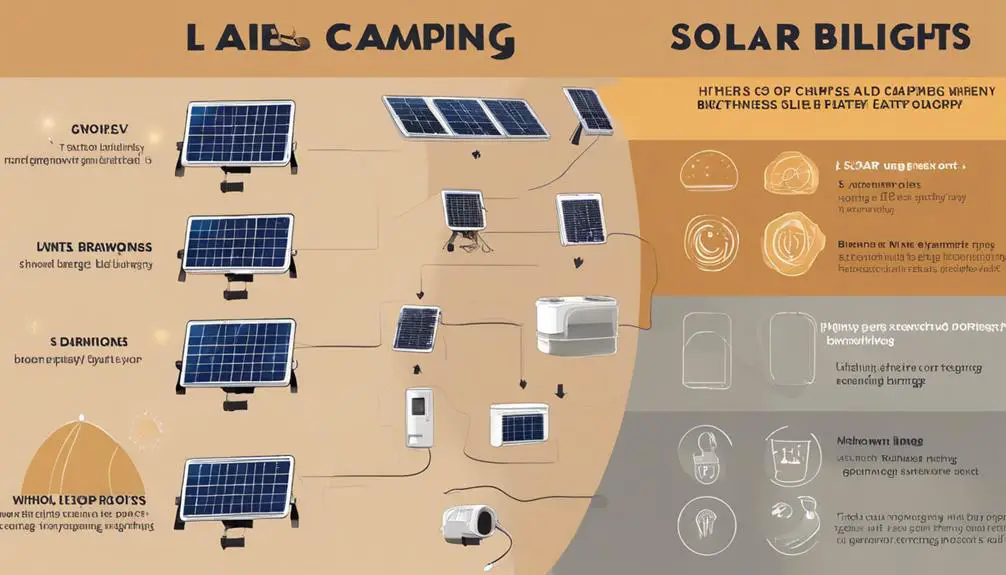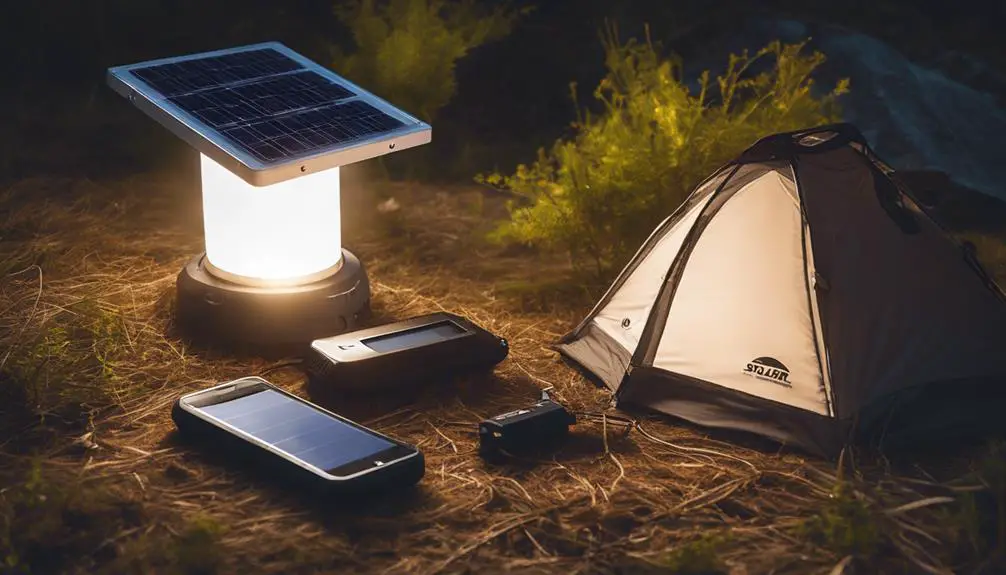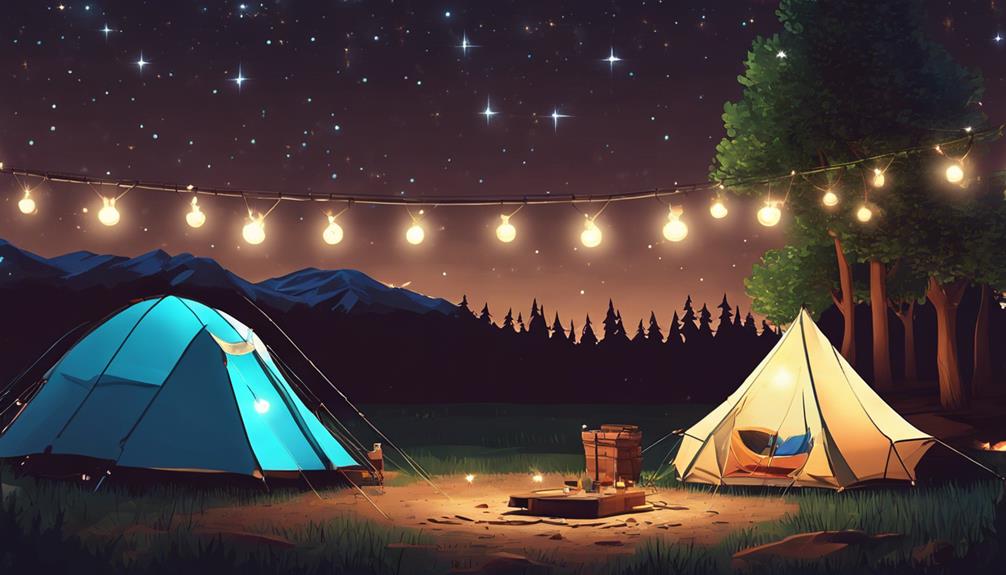When camping, solar lighting is a smart choice. It's energy-efficient, cost-effective, and eco-friendly. You can find various types like lanterns, string lights, and even portable panels. Consider factors such as brightness, durability, and weather resistance when choosing. Place your lights where they'll get the most sun, like pathways or common areas for safety. To make the most of solar power, position lights strategically and fully charge batteries before your trip. Remember, regular maintenance like cleaning panels and storing batteries properly will keep your lights shining bright.
Benefits of Solar Lighting for Camping

When camping, utilizing solar lighting offers numerous advantages that can enhance your overall outdoor experience. Solar lights are incredibly energy-efficient, utilizing sunlight to power up during the day and providing illumination at night without the need for electricity. This not only saves you money on energy costs but also reduces your carbon footprint, making it an eco-friendly choice for your camping adventures.
The convenience of solar lighting is unmatched. You can place solar lights anywhere that receives sunlight, without worrying about finding an electrical outlet. This flexibility allows you to light up your campsite, pathways, or even inside your tent with ease.
Additionally, solar lights are cost-effective in the long run. Once purchased, they require minimal maintenance and have a long lifespan, providing you with reliable lighting trip after trip without the need for frequent replacements.
Types of Solar Lights for Camping
Explore the diverse range of solar lights specifically designed for camping to find the perfect lighting solution for your outdoor adventures. Solar lanterns are excellent for illuminating larger areas at your campsite, providing a warm and ambient glow.
String lights offer a festive touch and are ideal for decorating tents or outdoor spaces.
Portable solar panels are a practical choice for charging your lights during the day, ensuring you have a reliable power source at night. They're lightweight and easy to set up, making them convenient for camping trips.
Flashlights are a staple for any camper, offering focused light for activities like hiking or finding your way around the campsite at night.
When selecting solar lights for camping, consider the size of your group, the duration of your trip, and the type of activities you'll be doing. Solar lanterns and string lights are great for creating a cozy atmosphere, while portable panels and flashlights provide essential lighting for practical use in the outdoors.
Factors to Consider When Choosing

Consider the specific requirements of your camping trip when selecting the most suitable solar lighting options for your outdoor needs. Power consumption is an essential factor to keep in mind when choosing solar lights for camping. Look for lights that offer a good balance between brightness and energy efficiency to guarantee they last throughout the night without draining the battery quickly.
Weather resistance is another important consideration. Opt for solar lights that are designed to withstand outdoor elements such as rain, wind, and dust. Look for lights with durable materials and waterproof ratings to make sure they can handle the unpredictable conditions you may encounter while camping.
Additionally, consider the ease of installation and portability of the solar lights to make setting up and moving them around your campsite hassle-free. By prioritizing power consumption and weather resistance when selecting solar lights for camping, you can ensure a reliable and efficient lighting solution for your outdoor adventures.
Setting Up Solar Lights at Campsite
To effectively illuminate your campsite using solar lights, position them correctly in areas that receive direct sunlight throughout the day. Guarantee the solar panels are placed where they can capture the most sunlight to maximize energy efficiency and enhance battery longevity. Placing the lights in unobstructed areas like open fields or the top of a hill can help achieve this.
When setting up your solar lights, consider the layout of your campsite to ensure sufficient nighttime visibility. Place lights along pathways, near the tent entrances, and around common areas like the cooking area or seating area. This strategic placement not only enhances the ambiance but also helps prevent accidents by clearly illuminating key areas.
Remember to periodically check and clean the solar panels to maintain peak performance.
Tips for Maximizing Solar Power

For best utilization of solar power during your camping trip, make certain your solar lights are positioned strategically to receive maximum sunlight exposure throughout the day. Start by placing your lights in open areas where they can soak up the most sunlight.
Peak solar panel efficiency is achieved when the panels are facing directly towards the sun, so adjust them accordingly as the day progresses.
To guarantee you have enough power throughout the night, consider the battery capacity of your solar lights. A larger battery capacity means more energy can be stored during the day, providing you with extended lighting hours after the sun sets.
Before heading out on your trip, fully charge the batteries to optimize their capacity.
Remember to regularly clean the solar panels to remove any dirt or debris that can obstruct sunlight absorption.
Solar Lighting Maintenance Tips
Regular upkeep of your solar lighting is vital to achieve peak performance during your camping excursions. To maintain your solar lights shining brightly, be sure to routinely clean the solar panels with a soft cloth and mild soapy water. This will guarantee maximum sunlight absorption. Additionally, check for any debris or obstructions that may be blocking the panels from receiving sunlight.
When it comes to battery storage, it's essential to store your solar light batteries properly when not in use. Remove the batteries from the lights if you won't be using them for an extended period. Store them in a cool, dry place away from direct sunlight. Make sure to recharge the batteries fully before your camping trip to ensure they provide optimal power during your outdoor escapades.
Frequently Asked Questions
How Long Does It Take to Charge Solar Lights for Camping?
To charge solar lights efficiently, consider sunlight exposure and panel maintenance. Regularly clean panels and place lights in direct sunlight. This optimizes charging time. Keep in mind that factors like weather conditions and panel quality can affect the speed of charging.
Can Solar Lights for Camping Withstand Rainy Weather?
Yes, solar lights for camping can withstand rainy weather. Their waterproof durability guarantees they are weather-resistant, making them suitable for outdoor use even in challenging conditions. You can rely on them to illuminate your camping site.
Are There Any Safety Precautions for Using Solar Lights at Campsites?
When camping, make sure solar lights are placed away from flammable materials to prevent fire hazards. Also, angle lights downward to minimize wildlife disturbances. Following these precautions will help you enjoy a safe and peaceful camping experience.
Do Solar Lights Attract Insects at Night?
At night, solar lights can attract insects due to their lighting effects. Factors like color and brightness influence insect behavior. Consider adjusting the light settings to minimize attraction while maximizing nighttime illumination and ensuring solar panel efficiency.
Can Solar Lights Be Used for Emergency Purposes While Camping?
Yes, solar lights can be used for emergency purposes while camping. Their durability guarantees reliability during unexpected situations. The brightness of solar lights provides sufficient illumination for safety and visibility in emergencies, making them a practical choice.
Conclusion
Overall, solar lighting for camping is a convenient and eco-friendly option that can enhance your outdoor experience.
With various types to choose from and easy setup, it's a simple way to illuminate your campsite without the need for batteries or electricity.
By considering factors like brightness, durability, and placement, you can guarantee you have the perfect lighting solution for your next camping trip.
Don't forget to follow maintenance tips to keep your solar lights running efficiently.
Happy camping!
